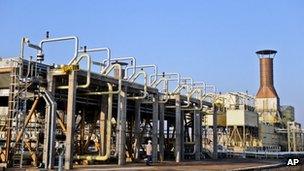US expands sanctions on Iran, targeting oil and media
- Published

The US has tightened existing sanctions on Iran, in an effort to push Tehran to abandon its alleged nuclear weapons programme.
The measures further restrict Iran's access to its own oil revenues but also include financial restrictions against Iran's state-run media.
The sanctions are coming into effect under the terms of a bill passed by Congress six months ago.
International talks on Iran's nuclear programme are due later this month.
Any money Iran now makes from the sale of oil to nine countries currently granted American waivers, including China, India and Turkey, must now be credited to an account in those countries and not repatriated to Iran.
Under the sanctions, the money can only be used by Iran to purchase goods from those countries.
Media sanctions
Financial institutions doing business with Iran know that they themselves risk being cut off from the American financial system if they break these strict new conditions.
Robin Wright: "Iran's been very clever at figuring out ways around sanctions, but at a cost"
The US Treasury said the new sanctions effectively "lock up" Iranian oil revenue overseas.
Treasury Under Secretary David Cohen said that the US would continue to tighten restrictions "so long as Iran continues to fail to address the concerns of the international community about its nuclear programme".
"We will also target those in Iran who are responsible for human rights abuses, especially those who deny the Iranian people their basic freedoms of expression, assembly and speech."
The latest announcement includes measures which have nothing to do Iran's nuclear programme, and focus instead on alleged efforts to stifle dissent.
The US Treasury also set sanctions against Iran's state broadcaster and its director, Ezzatollah Zarghami, over the transmission of forced confessions by political detainees and the jamming of foreign channels, including the BBC and Voice of America.
And it singled out the Iranian Cyber Police, which it says has deleted blogs and arrested a blogger, Sattar Beheshti, who later died in custody.
Iran, which says its nuclear programme is for energy generation and research, attacked the latest measures.
"This is the latest series of hostile actions against Iran," Iran foreign ministry spokesman Ramin Mehmanparast was quoted as saying by Mehr news agency. "We are seeking methods to neutralise the new pressure."
The new measures come ahead of the fourth round of talks between Iran and six world powers in Kazakhstan later in February.
A leading Iranian politician said last month Iranian oil revenues had fallen around 45% in the last nine months because of sanctions.
- Published3 February 2013
- Published25 November 2014
- Published11 January 2013
- Published8 January 2013